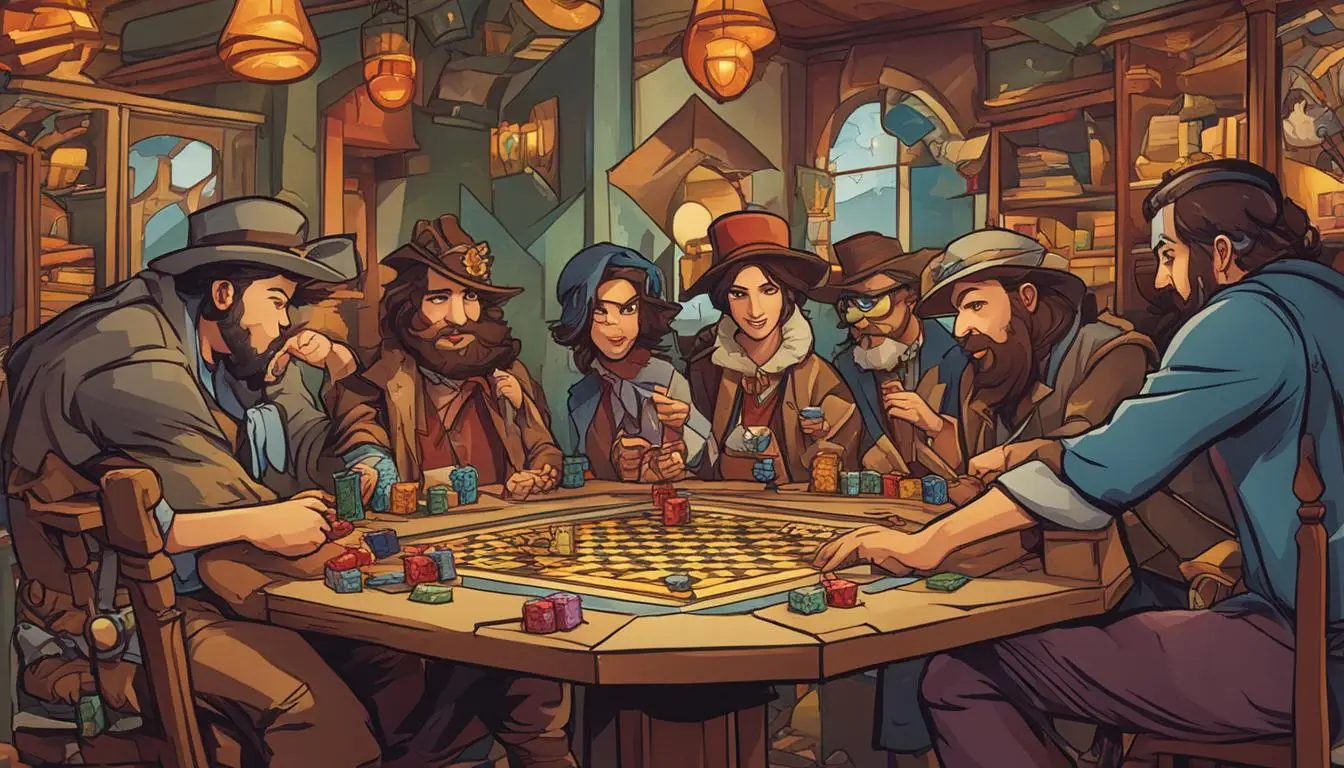- Your basket is empty.
There’s a special magic in gathering around a table with friends. It comes from our imagination and the shared stories we tell. These moments bring to life adventures that set our wonder free. The sound of dice rolling, our teamwork, and surprises in our games create lasting memories.
Jumping into these stories, we become leaders of our destiny. We explore new lands and go on timeless adventures. Each game is a door to new worlds full of adventure and discovery. Tabletop games take us to these incredible places while we’re just sitting with friends.
The Role of the Narrator in Shaping Tabletop Game Storytelling
In the world of role-playing games, the narrator does much more than set limits. They make the game come alive. They guide players through exciting places and complex stories.
The storyteller turns a basic rule book into an adventure-filled world. Each word invites players into a unique universe. The narrator shapes thrilling experiences for everyone.
The Game as an Artifact of Its Own Universe
A game that mirrors its universe offers a full, seamless experience. It acts as a relic of its own story world. All parts, from play to art, carry the game’s spirit.
This idea is key in many hit RPGs. Here, the game’s pieces are not just tools but parts of the tale.
Personifying The Game’s Narrative Voice
To give the narrative voice life, designers use distinct character voices matching the game’s theme. Be it a tough detective or a playful god, each voice tells a story.
Possum Creek Games shows how it’s done by crafting voices as well as the game itself.
Enhancing Engagement Through Storytelling Techniques
In role-playing games, a good story makes everything more exciting. The world’s lore is in every action and choice, making the game a journey.
Game makers are smart in mixing the story into every part of an RPG. This makes the adventure feel real and complete.
Interactive Fiction and the Evolution of Narrative Games
The world of narrative games has changed a lot because of interactive fiction. These games have made tabletop game storytelling much deeper and complex. You’re not just following a set story anymore. Now, every move and choice can create a unique story. This is all thanks to the players. Gloomhaven is a great example of this. In this game, stories grow naturally as you play and face new challenges.

What makes interactive fiction really stand out is how much it lets players make big choices. The game ‘Innovation’ shows how much tabletop games have changed. It lets you travel through history and make big decisions. This way of telling stories reminds us of the epic tales of old civilizations. It’s all about the growth, downfall, and new starts of societies.
When we compare old and new ways of telling stories in games, we see a big change. Tabletop game storytelling with narrative games has become more engaging and less predictable. Interactive fiction lets us dive into stories in a whole new way. Board games have become a space where stories are experienced in real life. They’re not just told; they’re felt and lived by the players.
Creating Immersive Gaming Experiences with Role-Playing Games
Role-playing games (RPGs) are at the core of immersive gaming experiences. They let players become unique characters in detailed worlds. RPGs, like Dungeons & Dragons, are known for their deep narrative storytelling. They give players the chance to choose their paths and change their stories.
Jumping into an RPG is like entering a huge universe. Every choice and interaction adds to a bigger story. Schools are starting to use RPGs, such as Dungeons & Dragons, for learning. North Dakota State University has studies showing these games can change the way we learn. They do this through active play and creative thinking.
RPGs offer more than fun; they are gateways to learning and growing emotionally. They draw players in with stories you can dive into. This makes RPGs useful not just in games but also in training, theater, and more. They aren’t just games; they are keys to unlocking our creativity and smarts.
Incorporating Narrative Elements in Game Mechanics
In the world of tabletop games, we find magic. It’s in the mix of game mechanics and storytelling elements. Game designers blend stories into game mechanics. This makes every game moment important. It turns gameplay into a rich adventure. Narrative games do more than entertain. They take players on an emotional journey. This makes every victory and challenge more meaningful.
The Story Behind Every Character’s Action
In narrative games, every story is unique, just like the players. Each character’s action is carefully crafted. It fits their history and reasons for acting. In “Undaunted”, units have names and stories. This makes players care more. And when a unit is lost, it feels like a real part of the story is gone. It’s not just a game move, but a loss in the story.
Using Game Mechanics to Enrich the Narrative
“Tyrants of the Underdark” uses game mechanics for storytelling. Every choice adds to a shared story. This makes each action significant beyond the game. The blend of storytelling elements and strategy makes the game thrilling. It’s not just about following rules. It’s about playing a role in a meaningful story.

